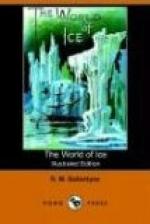In a few minutes Fred was able to stand and look about him with a stupid expression, and immediately the Esquimau dragged and pushed and shook him along towards the snow-hut, into which he was finally thrust, though with some trouble, in consequence of the lowness of the tunnel. Here, by means of rubbing and chafing, with a little more buffeting, he was restored to some degree of heat, on seeing which, Meetuck uttered a quiet grunt and immediately set about preparing supper.
“I do believe I’ve been asleep,” said Fred, rising and stretching himself vigorously as the bright flame of a tin lamp shot forth and shed a yellow lustre on the white walls.
“Aslaap is it! be me conscience an’ ye have jist. Oh, then, may I niver indulge in the same sort o’ slumber!”
“Why so?” asked Fred in some surprise.
“You fell asleep on the ice, sir,” answered West, while he busied himself in spreading the tarpaulin and blanket-bags on the floor of the hut, “and you were very near frozen to death.”
“Frozen, musha! I’m not too sure that he’s melted yit!” said O’Riley, taking him by the arm and looking at him dubiously.
Fred laughed. “Oh yes; I’m melted now! But let’s have supper, else I shall faint for hunger. Did I sleep many hours?”
“You slept only five minutes,” said West, in some surprise at the question. “You were only gone about ten minutes altogether.”
This was indeed the case. The intense desire for sleep which is produced in Arctic countries when the frost seizes hold of the frame soon confuses the faculties of those who come under its influence. As long as Fred had continued to walk and work he felt quite warm; but the instant he sat down on the lump of ice to rest, the frost acted on him. Being much exhausted, too, by labour and long fasting, he was more susceptible than he would otherwise have been to the influence of cold, so that it chilled him at once, and produced that deadly lethargy from which, but for the timely aid of his companions, he would never have recovered.
The arrangements for supping and spending the night made rapid progress, and, under the influence of fire and animal heat—for the dogs were taken in beside them—the igloe became comfortably warm. Yet the snow-walls did not melt, or become moist, the intense cold without being sufficient to counteract and protect them from the heat within. The fair roof, however, soon became very dingy, and the odour of melted fat rather powerful. But Arctic travellers are proof against such trifles.
The tarpaulin was spread over the floor, and a tin lamp, into which several fat portions of the walrus were put, was suspended from a stick thrust into the wall. Bound this lamp the hunters circled, each seated on his blanket-bag, and each attended to the duty which devolved upon him. Meetuck held a tin kettle over the flame till the snow with which it was filled melted and became cold water, and then




